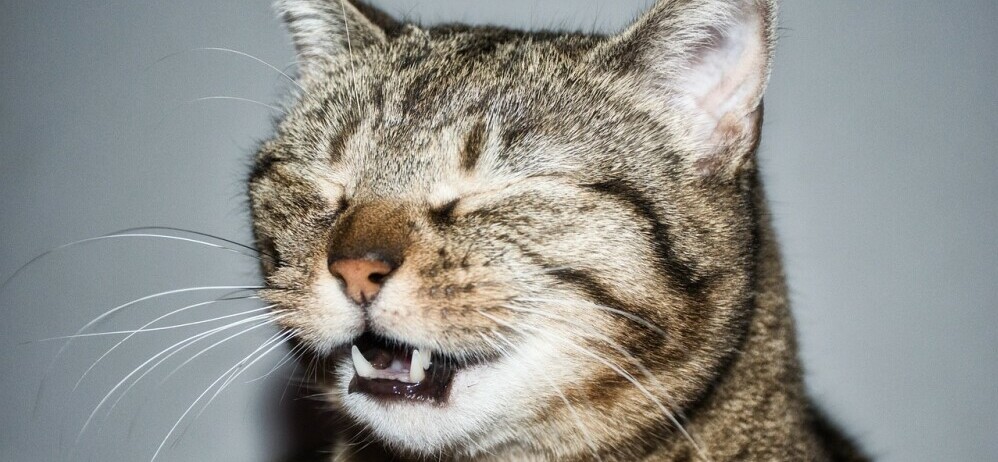Why Do Cats Sneeze? Understanding Your Feline’s Gesundheit Moment
Cats, with their graceful and often enigmatic demeanour, are cherished companions for millions worldwide. They bring us joy with their quirky antics, soothing purrs, and snuggly presence. But every now and then, even these seemingly untouchable creatures have a moment that reminds us they’re just like us—like a sudden, tiny “achoo!”
While they may seem resilient creatures, even our feline friends are not immune to occasional sneezing fits. But what prompts these sneezes, and should they be cause for concern?
If your feline friend sneezes, you might find it amusing at first (it’s undeniably cute!), but it can also spark a little curiosity or concern. What causes this adorable reflex, and when is it something to watch closely? In this article, we’ll chat about, the fascinating reasons behind those kitty sneezes and what they could mean for your cat’s health.

Understanding Feline Sneezing
Sneezing is a reflex—a quick, involuntary action triggered when the nasal passages are irritated. For cats, just like for us, it’s their body’s way of giving the nose a “spring cleaning.” Whether it’s a speck of dust, a whiff of pollen, or something more serious, the body’s natural response is to expel it forcefully through a sneeze. Just like humans, cats sneeze to clear their nasal passages and remove any potential irritants.
But did you know that feline sneezes can sometimes be an early clue about your cat’s health? Occasional sneezing is often harmless, but frequent or prolonged sneezing can be a sign that your cat’s body is reacting to an underlying issue.
Top 5 Reasons Cats Sneeze
1. Environmental Factors
Cats are remarkably sensitive to their surroundings, especially when it comes to smells and airborne particles. Dust, pollen, cleaning products, or even a particularly strong perfume can make your feline’s nose twitch. In addition to those things smoke, and other airborne particles can irritate a cat’s sensitive nasal passages, leading to sneezing. Indoor cats may be particularly susceptible to dust and other indoor allergens.
- Tip: To keep sneezing at bay, try using unscented cleaning products and air purifiers to minimize irritants, especially if your cat is primarily indoors.
2. Viral Infections
Feline viral infections, such as feline herpesvirus (FHV) and feline calicivirus (FCV), are common culprits behind sneezing in cats. These viruses can cause upper respiratory infections (URIs). These common infections don’t just cause sneezing, they can also lead to symptoms like sneezing, watery eyes, nasal discharge, and congestion.
- Fun Fact: Cats with FHV may carry the virus for life. It tends to flare up during times of stress, much like cold sores in humans!
3. Bacterial Infections
Bacterial infections, such as those caused by Bordetella bronchiseptica or Mycoplasma spp., can also trigger sneezing in cats. These infections can hitch a ride on an existing viral infection, turning a simple sneeze into a more complex health concern. Often occurring secondary to viral infections or in environments with poor hygiene when the immune system isn’t at its strongest they may need veterinary attention and treatment. These infections are more common in multi-cat household or shelters where germs can spread easily.
- What to Watch For: Look for yellow or green nasal discharge—this is often a sign of bacterial involvement.
4. Allergies
While cats aren’t known for dramatic allergy sneezes like some humans, they can have allergic reactions to things like dust mites, mold, or even specific foods. Sneezing may be accompanied by itching or watery eyes, adding to the puzzle.
- Pro Tip: If you suspect allergies, talk to your vet about potential triggers. In some cases, a hypoallergenic diet or medication may help.
5. Foreign Objects
Cats are naturally curious creatures, and their investigative sniffs sometimes lead them astray. A blade of grass, a seed, or even small toys can get lodged in their nasal passages, causing discomfort and sneezing.
- When to Act: If your cat has sudden, repeated sneezing paired with pawing at their face, a foreign object might be the culprit.

When to Worry About Cat Sneezing and Seek Veterinary Attention
While occasional sneezing is usually harmless, persistent or severe sneezing may indicate an underlying health issue that requires veterinary attention. Additionally, if sneezing is accompanied by other symptoms such as lethargy, appetite loss, coughing, or discharge from the nose and eyes it could indicate a bigger issue. If you notice these symptoms, schedule a vet visit to rule out infections, allergies, or other concerns. If you’re unsure it never hurts to get in contact with your veterinarian to discuss the best course of action for your cat!
How to Help a Sneezing Cat
- Create a Clean Environment: Minimize airborne irritants like dust, smoke, or strong scents.
- Boost Their Immune System: Good nutrition and regular veterinary care can help keep sneezes at bay.
- Humidify the Air: If your home is dry, a humidifier can help soothe irritated nasal passages, especially in winter.
FAQs About Cat Sneezing
Q: Can cats catch colds from humans?
No, cats don’t catch colds from humans. However, they can pick up their own version of respiratory infections from other cats. These infections are often caused by specific feline viruses or bacteria.
Q: Is occasional sneezing normal?
Yes, occasional sneezing is usually nothing to worry about. Cats sneeze for many of the same reasons we do—dust, tickling sensations, or minor irritants.
Q: How do I know if sneezing is serious?
Frequent sneezing, especially with nasal discharge, lethargy, or reduced appetite, could point to a health problem. When in doubt, consult your vet!
Q: Should I be concerned if my cat sneezes?
Occasional sneezing is usually harmless and may be due to minor irritants in the environment. However, if sneezing becomes frequent or is accompanied by other symptoms, it’s best to consult a veterinarian for a proper evaluation.
Q: How can I help alleviate my cat’s sneezing?
Keeping your cat’s environment clean and free of dust and allergens can help reduce sneezing due to environmental irritants. Additionally, ensuring proper nutrition and regular veterinary check-ups can help maintain your cat’s overall health and immune function.
Conclusion
Cats sneeze for all sorts of reasons, from pesky allergens to viral or bacterial infections. While the occasional “achoo” is perfectly normal, knowing when to take action can make all the difference in your cat’s comfort and health.
By keeping your feline’s environment clean, offering proper care, and staying alert for any unusual symptoms, you can help your furry friend breathe easy.
Further Reading:
Curious about more feline quirks? Check out these articles:
- Exploring Feline Allergies: Do Cats Get Allergies? Discover how to spot and manage common feline allergies.
- The Purr-fect Mystery Unveiled: Why Do Cats Lick People? Uncover the surprising reasons behind your cat’s affectionate (and sometimes quirky) licking habits.
- How Long Are Cats Pregnant? Learn all about feline pregnancy—from the timeline to how to prepare for those adorable kittens.
- Unraveling the Feline Tapestry: From Dinosaur Kinship to Domestic Bliss. Discover the fascinating evolutionary journey that turned wild hunters into our cozy companions.
- How do cats have nine lives? Dive into the myths and truths behind this age-old saying—are cats really the ultimate survivors?
- What Do Cats Hunt? Explore your cat’s instinctive hunting behaviors and what they mean for your curious companion.
Have questions or your own sneezing cat story? Drop us a comment or email us at contact@commoncuriosities.com!
Thanks for reading! If you liked this article please leave us a comment and check out some of our others! Feel free to share on social media as well, it helps us grow! Have a specific query you want answered? Shoot us an e-mail at contact@commoncuriosities.com




